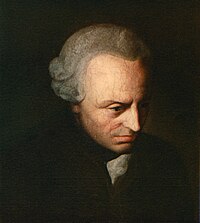
Back نقد العقل العملي Arabic Praktik zəkanın tənqidi Azerbaijani Crítica de la raó pràctica Catalan Kritik der praktischen Vernunft German Kritiko de Praktika Racio Esperanto Crítica de la razón práctica Spanish Praktilise mõistuse kriitika Estonian Arrazoimen praktikoaren kritika Basque نقد عقل عملی Persian Käytännöllisen järjen kritiikki Finnish
You can help expand this article with text translated from the corresponding article in German. Click [show] for important translation instructions.
|
 1788 German edition | |
| Author | Immanuel Kant |
|---|---|
| Original title | Critik a der practischen Vernunft |
| Translator | Thomas Kingsmill Abbott |
| Language | German |
| Subject | Moral philosophy |
| Published | 1788 |
| Media type | |
| Preceded by | Critique of Pure Reason |
| Followed by | Critique of Judgment |
| a Kritik in modern German. | |
| Part of a series on |
| Immanuel Kant |
|---|
 |
|
Category • |
The Critique of Practical Reason (German: Kritik der praktischen Vernunft) is the second of Immanuel Kant's three critiques, published in 1788. Hence, it is sometimes referred to as the "second critique". It follows on from Kant's first critique, the Critique of Pure Reason, and is one of his major works on moral philosophy. While Kant had already published one significant work in moral philosophy, the Groundwork of the Metaphysics of Morals (1785), the Critique of Practical Reason was intended to develop his account of the will as determinable by (or able to act from) the moral law alone, place his ethical views within the larger framework of his system of critical philosophy, and expand on certain themes in his moral philosophy such as the feeling of respect for the moral law and the concept of the highest good.